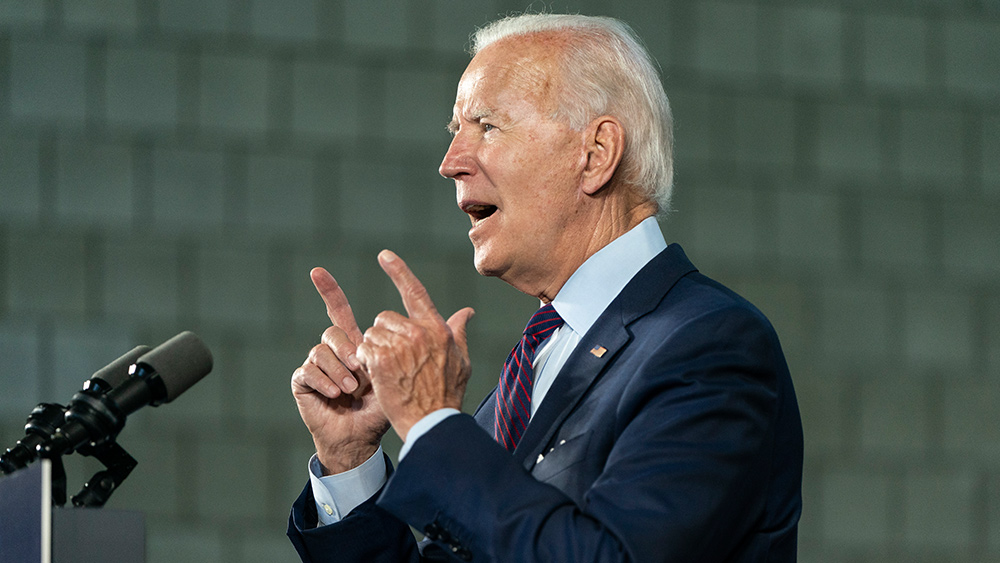Confident in confirmation: GOP senators confirm Judge Barrett in Oct. 26 final vote
10/27/2020 / By Ramon Tomey

The Senate voted on Oct. 26 to confirm President Donald Trump’s nominee, Judge Amy Coney Barrett, to the Supreme Court. Senate Majority Leader Mitch McConnell (R-KY) confirmed the timing of a final vote on her nomination during a weekly press conference. “With regard to the Supreme Court justice … we’ll be voting to confirm justice-to-be Barrett next Monday,” he said.
McConnell added: “I think that will be another signature accomplishment in our effort to put on the courts … men and women who believe that the job of a judge is to actually follow the law.”
The Kentucky senator and his Republican colleagues in the Senate appear confident they will have the votes to put Barrett on the Supreme Court as an associate justice. The GOP currently holds 53 Senate seats; even though three senators vote against her, she could still be confirmed by letting Vice President Mike Pence break a tie. If Pence breaks the tie in his capacity as the Senate president, it might be the first time a vice president would cast a vote to confirm a Supreme Court nominee.
Some GOP senators and aides have previously told The Hill that a final vote for confirming Barrett was likely to be set up on Monday, aligning with McConnell’s announcement. This would permit senators to campaign for the last week before the election.
After the Senate Judiciary Committee signs off on her nomination Thursday, McConnell is expected to file for a required procedural vote on Barrett’s nomination Friday. The Senate will then hold a procedural vote on Sunday, and senators could still debate her nomination for an additional 30 hours.
Barrett’s nomination and upcoming confirmation to the highest court of the land came after the death of Justice Ruth Bader Ginsburg in September 2020. Trump said he would nominate a woman to take Ginsburg’s seat, with either Barrett or Judge Barbara Lagoa as the strongest contenders.
Barrett will face a barrage of criticism owing to her appointment by Trump
However, not all GOP senators concur with putting Barrett on the Supreme Court bench.
The Hill reported that only Sen. Susan Collins (R-ME) has expressed opposition to Barrett, as she does not believe a Supreme Court nominee should be considered before the election. Meanwhile, Sen. Lisa Murkowski (R-AK) shared the same opinion as Collins that a nominee should not be taken up prior to the election. Murkowski hasn’t said how she will vote on Barrett’s nomination; she is expected to meet with Barrett before voting.
Barrett is the second Supreme Court nominee under the Trump administration, after Justice Brett Kavanaugh in 2018. Democrats have also leveled criticism against Barrett during her confirmation hearing, arguing she would put the Affordable Care Act in peril. She answered this accusation by saying that she was “not here on a mission to destroy” the law passed by former President Barack Obama.
Aside from the Affordable Care Act, Democrats are also attacking her for opposing Roe v. Wade, the ruling advocated by her predecessor Ginsburg that served as a legal ground for abortion. Unsurprisingly, the mainstream media and their leftist allies worked double time to smear Barrett.
Democrats previously tried to derail Justice Brett Kavanaugh’s confirmation as the next Supreme Court justice two years ago, even going so far as to accuse him of sexual misconduct. However, not even the false testimonies of psychology professor Christine Blasey Ford were able to stop Kavanaugh’s confirmation. He was confirmed in October 2018 on a 50-48 vote and has been serving on the bench since.
Barrett’s confirmation on the Supreme Court bench heralds a more conservative leaning for the courts of the land, much more in line with American values.
Sources include:
Tagged Under: Amy Coney Barrett, Associate Justice, confirmation hearing, confirmation vote, conservative ruling, court decision, Donald Trump, federal court, federal court decision, judicial nominee, President Trump, Republican Senate, Ruth Bader Ginsburg, scotus, Senate hearing, Supreme Court, Supreme Court Justice
RECENT NEWS & ARTICLES
COPYRIGHT © 2017 WHITE HOUSE NEWS


















